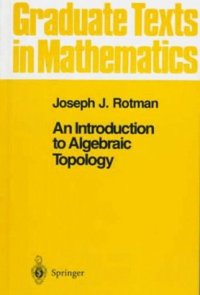
Ebook: An Introduction to Algebraic Topology
Author: Joseph J. Rotman (auth.)
- Genre: Mathematics
- Tags: Algebraic Topology
- Series: Graduate Texts in Mathematics 119
- Year: 1988
- Publisher: Springer-Verlag New York
- City: New York
- Edition: 1
- Language: English
- pdf
There is a canard that every textbook of algebraic topology either ends with the definition of the Klein bottle or is a personal communication to J. H. C. Whitehead. Of course, this is false, as a glance at the books of Hilton and Wylie, Maunder, Munkres, and Schubert reveals. Still, the canard does reflect some truth. Too often one finds too much generality and too little attention to details. There are two types of obstacle for the student learning algebraic topology. The first is the formidable array of new techniques (e. g. , most students know very little homological algebra); the second obstacle is that the basic defini tions have been so abstracted that their geometric or analytic origins have been obscured. I have tried to overcome these barriers. In the first instance, new definitions are introduced only when needed (e. g. , homology with coeffi cients and cohomology are deferred until after the Eilenberg-Steenrod axioms have been verified for the three homology theories we treat-singular, sim plicial, and cellular). Moreover, many exercises are given to help the reader assimilate material. In the second instance, important definitions are often accompanied by an informal discussion describing their origins (e. g. , winding numbers are discussed before computing 1tl (Sl), Green's theorem occurs before defining homology, and differential forms appear before introducing cohomology). We assume that the reader has had a first course in point-set topology, but we do discuss quotient spaces, path connectedness, and function spaces.
Each text that I have read by Rotman is logically sound, well thought out, there are ample explanations, exercises as well as examples, and moreover, Rotman does an excellent job proving results. Sure he leaves the reader to prove certain results but, in general, all major concepts he will prove or, when it comes to familiar sticking points for students, Rotman will show that reader how to effectively prove these types of results. Now, Algebraic Topology is not an easy subject (actually it is a beautiful and far-reaching subject) and, depending upon the authors approach, the level of 'mathematical' maturity required can quickly escalate. Rotman's text is just above middle of the road with respect to this proverbial and undefined notion-'mathematical maturity'. Not as far-off as Spanier and not quite as gentle as Hatcher. For the reader who has this maturity or the necessary background, then Rotman's text is a must read provided you enjoy texts that follow the theorem-proof-theorem format. Furthermore, the logical consistecny with respect to how and when material is present to the reader places this text in a league of it's own. Without a doubt I could imagine any beginning graduate student or confident undergradute tackling this text on their own. For example, I am no math wizard but with only a background consisting of point-set topology with an introduction to the Fundamental Group, Abstract Algebra (Hungerford style) and Analysis (Rudin style) I was able to begin reading and, in particular, solving problems from Rotman's text while a senior undergraduate. For those of you who would like to learn the subject and learn it well but who are scared of this text (Springer can do that to people) I wouls strongly recommend pairing this text with Allen Hatchers or Part II of James Munkres' text depending on your level of enjoyment with respect to suffering your way through texts. In fact, I would suggest reading Munkres in its entirety since, this approach would properly prepare your for Rotman's text and the transition would be seamless. Finally, if, while reading this text you find yourself feeling lost during the initial chapters due to the use of Category Theory, I would suggest pushing forward and not becoming too hung up on acquirring a 'total' understanding. Things will make more sense as you progress through the later chapters. Enjoy and good luck!